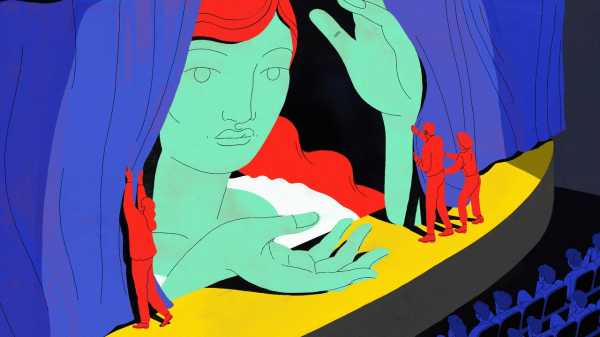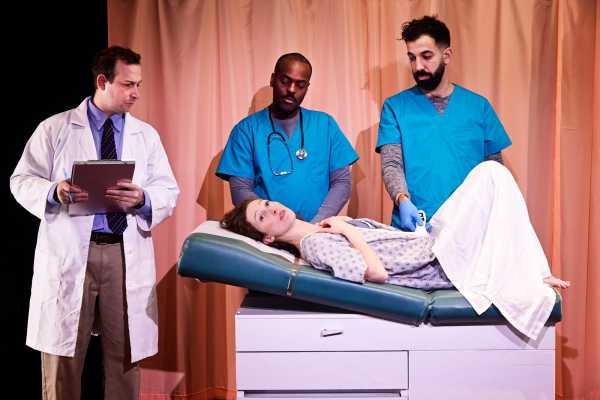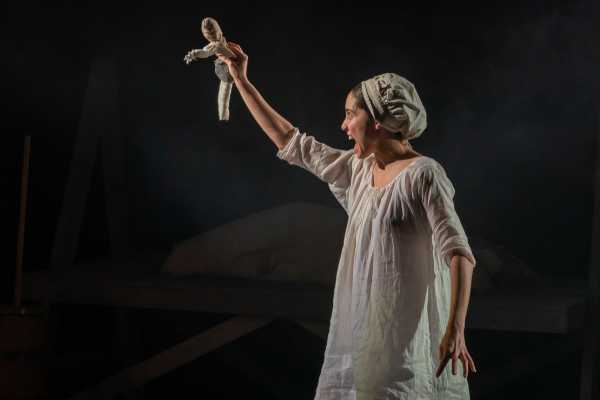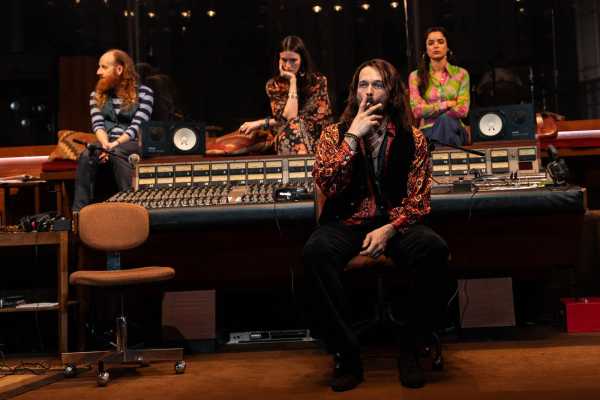
Save this storySave this storySave this storySave this story
The theatre season of 2023 is, in some ways, a season of the past. Some of this year’s Broadway productions actually premièred downtown last year, like the Pulitzer Prize-winning “Fat Ham,” at the Public, which had a run this spring, at the American Airlines Theatre, and the delicious “Merrily We Roll Along,” at New York Theatre Workshop, which is currently breaking house box-office records at the Hudson. Moreover, we are still (somehow) seeing a few shows that were delayed by the pandemic. They glide onto the stage, with glacial deliberation, the silt of three years ago still caught in their ice.
Over all, dark, meditative productions prevailed, often with their sets literally sunk in shadow. The shows that drew us took place in primordial woods, or an ink-black night, or London in the smog—we spent a lot of 2023 peering. Theatre clearly remembered that it’s good at providing introspection and long-duration thought. Many of the shows therefore also gave up the haste that characterizes so much of modern playwriting. There are several pieces on this list that unfolded unhurriedly, some in the course of nearly three hours. Perhaps we’ve been trained by streaming to binge on narrative? Or perhaps playwrights are trying to guide us back to a stiller, more patient mode of experience.
As we considered our favorite productions of 2023, we knew there were several shows on the near horizon that we wouldn’t be able to include. Branden Jacobs-Jenkins’s Broadway début, a revival of his fanged family comedy “Appropriate,” opened to the press only after we wrote this list, as did Broadway’s “How to Dance in Ohio” and the musical adaptation of “Buena Vista Social Club,” at the Atlantic Theatre Company. But the best way to end a year is in wanting more, so it feels only right that our “end”-of-year list—presented here in chronological order—is necessarily partial.
“Des Moines”
There were lots of unresolved threads in this production of a rambling, poetic, somewhat mystical play by the late Denis Johnson, which opened last December, at Theatre for a New Audience’s Polonsky Shakespeare Center, after we put together the 2022 end-of-year list. But I didn’t go to the theatre that night looking for answers—just a dark room and some voices worth believing in for a while. What the play offers is a few longueurs about life and, importantly, an all-night party, rendered with blurry economy and Dionysian delight. That’s often more than enough for a good time. As an off-kilter priest, the off-kilter Michael Shannon was delightful to watch. Hari Nef was funny and heartening and odd as a young adult with a wheelchair and a devilish sense of humor. More unnecessary Christmas lights on stages, please. —Vinson Cunningham

“The Appointment”
This show, a kind of cabaret, created by Lightning Rod Special and staged at WP Theatre, tells a seemingly simple story: a woman walks into a clinic, looking for an abortion. But here in post-Roe America we all know that nothing could be less simple in practice, or more harrowing in politics. The show goes inward—literally—rather than panning out to survey the cultural field. Instead of nosy politicians or activists on the streets, the dramatis personae are a bunch of singing, dancing, shtick-dispensing fetuses, implicitly doomed to get the “hook.” The production was bawdy, line-crossing, occasionally moving, always fun. —V.C.
“Endgame”
This masterwork by Samuel Beckett, displaying several of the Master’s grand themes and favored scenarios—two men alone, implicitly trapped, waiting for a liberation whose context is unclear and whose reality seems far off—was, above all else, a showcase for some of the best acting I saw all year. Bill Irwin’s clown-based physical precision met John Douglas Thompson’s Shakespearean brio in a way that clarified both originary styles, giving them valences and deep reserves of metaphorical meaning that I won’t soon or, really, ever forget. The audience I sat in at the Irish Repertory Theatre was riveted, immersed under the spell of the performances and the varying sparks of despair and brief hope that they cast off. Here, as elsewhere, Beckett uses repetition—in this case, within the context of a master-servant relationship between a chair-bound tyrant and his increasingly miserable manservant—as an ever-intensifying logic, revealing new depths as familiar incidents revolve. —V.C.
“Public Obscenities”
We’re lucky that Shayok Misha Chowdhury’s intricate bilingual drama is returning in 2024 for an encore run, at Theatre for a New Audience—though I know I’ll miss the proximity it had at its original space, the tiny Soho Rep. The show, a literary marvel, benefits from closeness: in a small Kolkata home, smoky sunshine drifts in through a high window, dust motes eddying in the complex emotional currents among a Bengali Ph.D. student visiting from the U.S., his queer research subjects, his American cinematographer boyfriend, and his welcoming Indian family. Hints of erotic secrets flicker in the text, and in our peripheral vision: Chowdhury’s brilliance lies in demonstrating how familiarity, even the kind we get from spending nearly three hours with these finely drawn characters, doesn’t insure intimacy. —Helen Shaw

“The Good John Proctor”
Arthur Miller’s “The Crucible,” with its guy-centric retelling of the Salem witch trials, has clearly provoked a number of playwrights into reëvaluating that fraught history—recent examples include Sarah Ruhl’s “Becky Nurse of Salem” and Kimberly Belflower’s “John Proctor Is the Villain.” I certainly thought that we had dug up all there was to find in those Massachusetts woods. Yet Talene Monahon’s deft, wicked play, directed by Caitlin Sullivan for Bedlam, at the Connelly, and shrouded in New England gloom, managed its own witchcraft: a thrilling new perspective on the Salem girls’ adolescent minds, revealing their yearning for mystery, and the pernicious influence of the men who desire them. The finest example yet of the recent mania for modern vernacular in old-timey settings, Monahon’s play was comic line by line, but the cumulative effect was horror. The performers, too, were stupendous—Brittany K. Allen, Sharlene Cruz, Tavi Gevinson, and Susannah Perkins all played their child characters as dear little poppets with burning eyes. —H.S.
“Sweeney Todd”
It was a year full of starry Stephen Sondheim productions: his final project, the half-musical “Here We Are,” at the Shed; the Broadway transfer of “Merrily We Roll Along,” made buoyant at last by a cast of darlings; and his operatic masterpiece, the soot-dark monster “Sweeney Todd,” staged by Thomas Kail in what looked like a hole blasted into the stage of the Lunt-Fontanne. When I saw “Sweeney,” in March, I shook off its horror, unthreatened by either Josh Groban’s milquetoast creepster version of the demon barber or Annaleigh Ashford’s frolicking Mrs. Lovett. But time—and those other Sondheim productions—kept bringing it to mind. Musical power on such a scale creates a sense of pursuit; I often felt the show haunting me through the months, its immense sound (those shrieking sopranos! those terrorizing piccolos!) stalking my memory. —H.S.
“The Comeuppance”
This, the newest play by Branden Jacobs-Jenkins, is probably, to date, my favorite work of dramatic art about COVID-19. (The pickings are slim so far, but still.) Directed in the ominous dark by Eric Ting, for Signature Theatre, the show centers on a group of friends brought back together by their high-school reunion. Their fates have diverged—one’s a blue-chip artist, one’s married to a cop she doesn’t love, one’s got a bad case of diabetes and is gradually losing her sight—but they still share the verbal and emotional rhythms that pace the relationships between tight-knit and intense groups of young friends. Another invisible presence, Death, in all its awful glory, inhabits each of their bodies at intervals, making disclosures and promising, as the tense night rolls forward, to claim a tribute. —V.C.

Ahron R. Foster
“Infinite Life”
One of the most anticipated plays of the year, Annie Baker’s meditation on pain, at Atlantic Theatre Company, managed to surpass even my high hopes—partly by putting my sense of hope, and several of my other senses, into a kind of hypnotic stasis. In this long, seemingly motionless interlude, women at a clinic try to address their chronic conditions by extreme fasting. They sit on lounge chairs, in the red California sun, conducting a suspended existence that’s both stunned and sharpened by starvation; they make desultory, droll conversation, which accrues, stealthily, into a strangely funny play. Baker, whose maybe-avatar in the production was played by Christina Kirk, seems to have learned a great deal in the past several years, through her own suffering and in examining the suffering of others. That knowledge is cruel and inconceivably old: when one woman completes her time at the clinic, she drinks a green smoothie, and it’s as bright as the apple in Eden. —H.S.
“Purlie Victorious”
The more I think about this production of Ossie Davis’s raucous, politically perilous 1961 comedy, on Broadway at the Music Box Theatre, the more I admire the always busy director Kenny Leon’s deft, musical handling of his startlingly good ensemble. Leslie Odom, Jr., as the eponymous hero, a preacher in pursuit of social justice and the real-estate equivalent of his people’s proverbial forty acres and a mule—in this case, a local church of great importance to the Black community of a sharecropping plantation—is, at turns, hilarious, expressionistic, and righteously moving. If Leon’s production is remembered decades down the line (and I think it has a chance), it will be because it led yet more audience members into acquaintance with Kara Young, a bracing performer who left her imprint, maybe forever, on Lutiebelle Gussie Mae Jenkins, a character originated by the great Ruby Dee. —V.C.

“Stereophonic”
The playwright David Adjmi knows his way around a pop-culture phenomenon—his other plays include “3C,” a burlesque of “Three’s Company,” and a portrait of Marie Antoinette, our bouffant influencer queen. Now he’s turned his wry eye to “Rumours,” or at least a near-image of the prolonged process of that famously troubled, famously spectacular album by Fleetwood Mac. The show, at Playwrights Horizons, had two channels: in the foreground, the control room, where the producer and the recordist govern sound levels; upstage, the glassed-in recording booth itself, where the musicians jam and fight. The director Daniel Aukin forged the stellar ensemble into a credible band, so the snippets of songs we heard, by Will Butler, helped us understand why they’re willing to endure so much: the music makes the reason, which in turn makes the play. (As an alt-art bonus, upstairs, in Playwrights’ small space, the tremendous clown Alexandra Tatarsky, who uses they/them pronouns, was performing their superb “Sad Boys in Harpy Land,” a one-person lampoon of sad German literary boys—Goethe’s Wilhelm Meister, Günter Grass’s Oskar Matzerath—while, in the face of actual state violence, making heartbreaking fun of their own ineffectuality as an artist.) —H.S. ♦
Sourse: newyorker.com
